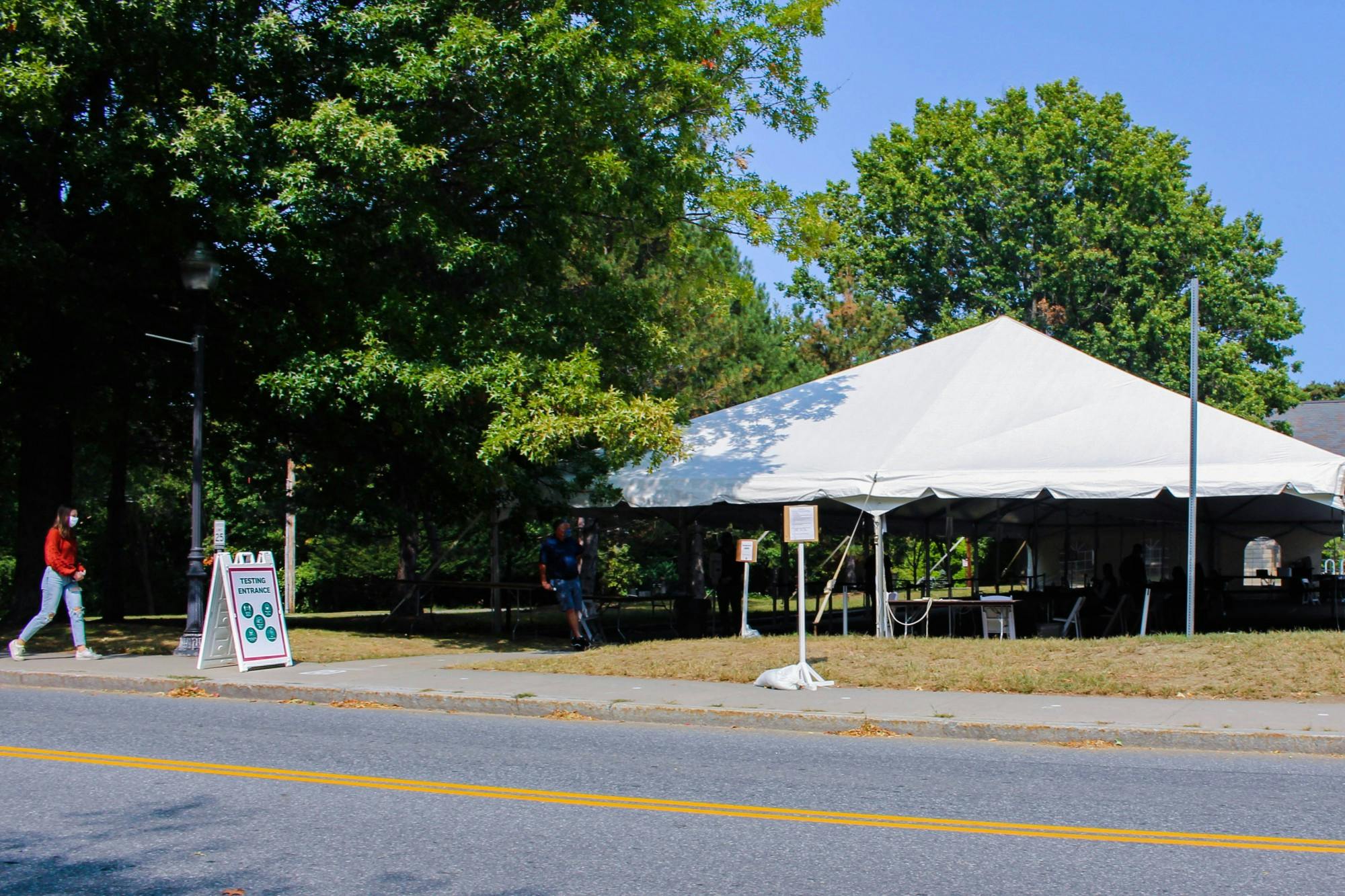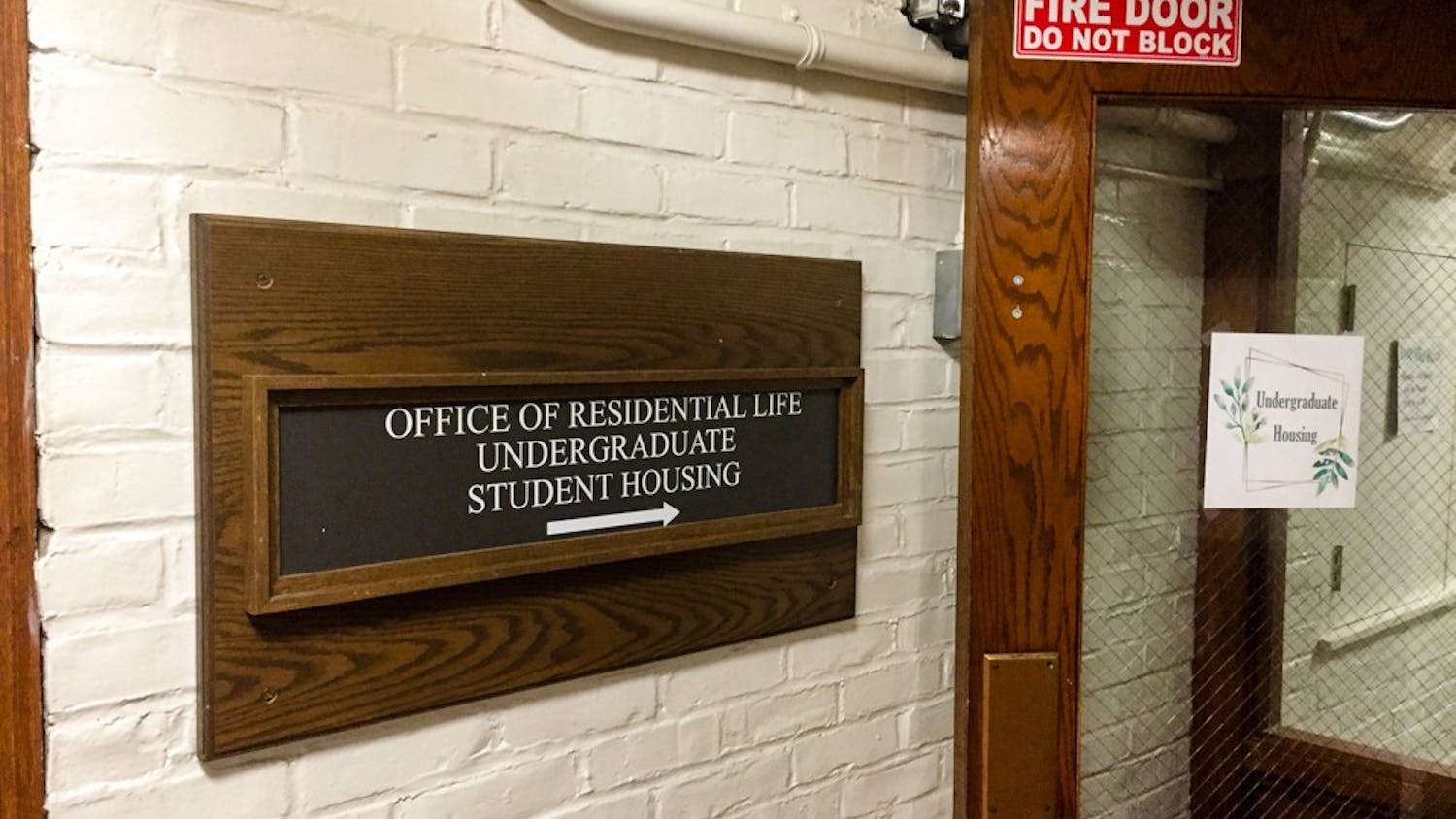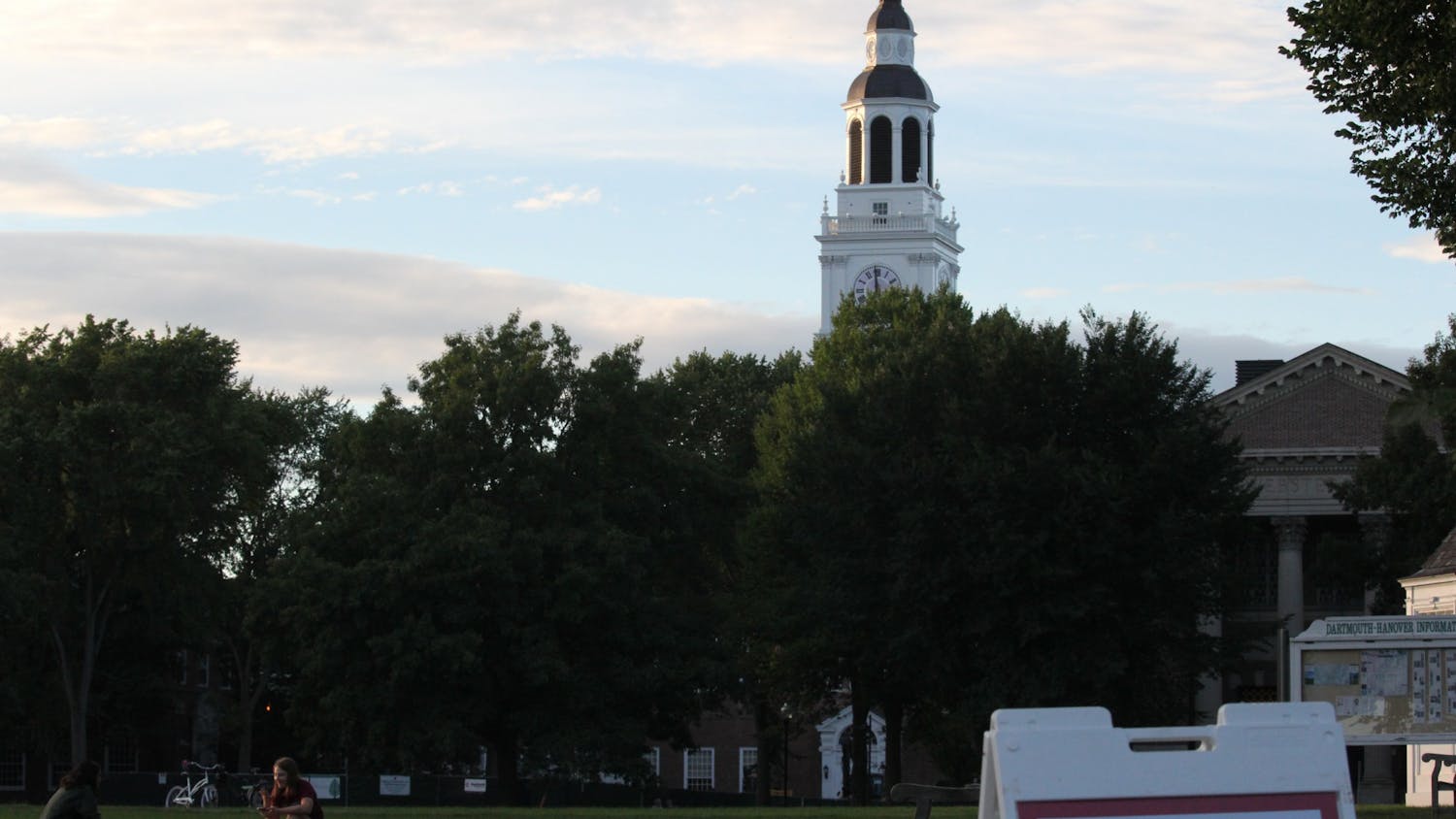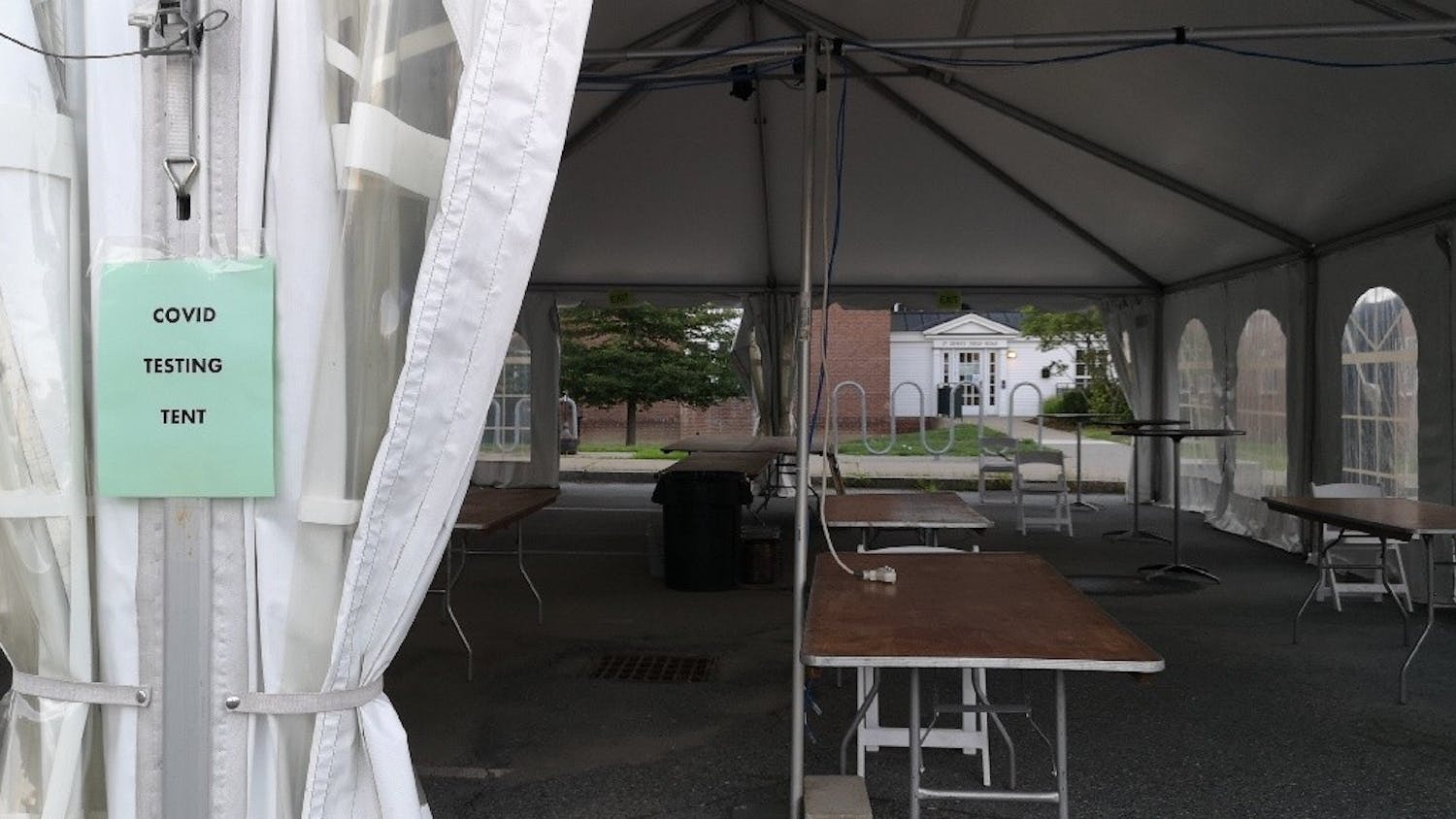Despite long lines, testing delays and undetected outbreaks at other colleges nationwide, Dartmouth’s comprehensive COVID-19 testing has so far gone as planned, in an effort to help keep the virus contained on campus.
As of Wednesday, Dartmouth’s online dashboard reported that Dartmouth had seen just two positive COVID-19 tests out of the 8,048 performed on 5,254 students, faculty and staff at testing sites on campus.
“It’s really been an amazingly seamless process,” said Dick’s House office manager Pam Holbrook, who serves as site operations manager for the testing location.
Most graduate students have been tested upon arrival in the Upper Valley, many earlier in the summer. Students began arriving on campus for the fall term on Sept. 7 and were tested on the day they arrive — “day zero” — as well as three and seven days afterward.
Students approved for on-campus enrollment also received pre-arrival testing in the mail from Vault Health, a company that before the pandemic specialized in at-home testosterone treatments.
Monday brought both the beginning of classes for the fall term and the first round of testing for undergraduate students living off campus. Those tested included many students living on campus receiving their second test and some graduate students, in addition to off campus students, Holbrook said.
Monday morning brought somewhat longer lines, as students who had class conflicts with their pre-assigned times were told in an email from health service director Mark Reed to arrive “as early in the day as possible” — but the surge soon passed. By midday, a student could arrive, complete a test and leave in around 15 minutes.
“I was expecting longer lines,” Nina Paripovic ’22, who is living off campus in Hanover, said. “I waited for, like, a minute. I heard at the start of the day it was really busy, but [now it’s] like, no complaints.”
Aditya Choudhari ’22 said that he, too, was “pleasantly surprised” by Dartmouth’s testing process. Choudhari, who is living on campus in the Kappa Kappa Kappa fraternity house, said that it was his second time getting tested and that both experiences were fast and convenient.
After arriving at the tent in the Maynard Lot near the McLaughlin cluster, mask-wearing students must wait in a socially distanced line to be tested. Testing workers move down the line, asking whether each student has tested positive or has any symptoms from a short list. Students then sign a consent form, show identification and move to a testing table, where more staff explain how they should perform the nasal swab on themselves.
“I thought it was pretty pleasant,” Eva Yao ’23, who is living off campus in White River Junction, said of her testing experience. “To be completely honest, I was expecting much worse.”
After being tested, students are directed out of the tent and, if it is their first test, given a small packet of materials including “Quarantine FAQs,” a pamphlet from the Dick’s House pharmacy and small trinkets such as Dartmouth-Hitchcock Medical Center- and Dick’s House-themed pop sockets, sunglasses, pens or reusable straws.
According to the packet’s FAQs, students will receive their results within two to three days, though some students heard back with negative results from Monday morning tests as early as Monday evening.
For some freshmen, the experience of immediate testing upon arrival was somewhat jarring. Amogh Pande ’24 said that other than the mandatory masks, his ride from Boston on the Dartmouth Coach felt normal, as he was able to talk with the other students riding up with him. Upon arrival, however, he was told to drop his bags and immediately head to the testing tent.
“The entire romantic experience of college is ruined from the start,” he said. “You come to this beautiful campus, you just met your fellow classmates and then all of a sudden, you’re snapped right back to the reality of what’s going on in the world.”
Caroline Hall ’24 said that she was grateful her parents were able to drive with her to campus from their home in New Jersey, but the experience still felt off.
“It was definitely kind of weird,” Hall said. “I think I had always imagined a very different experience coming to college for the first time.”
The College staff at the testing site, however, were “super welcoming,” Hall said.
“It was clear that [the testing staff] was happy that students were coming back,” she said.
Both Hall and Pande said they got their first test results back within 24 hours and that their second and third tests were just as quick as the first.
Students are not the only ones tested — the College has run 1,302 tests on 1,295 faculty and staff, according to the dashboard.
Dartmouth Dining workers Valentina Hodgdon and Evelyn Waugh, who on Monday were staffing the Dartmouth Dining meal tent across the street from the testing center, both said they were tested a week ago. Waugh added that Dartmouth Dining workers would be tested “periodically” throughout the term.
Despite overall success, one part of the testing process that has raised questions is how students get to the testing site. In Reed’s Sept. 12 email, students living off campus were told to “please walk or take Advance Transit to reduce the number of cars arriving throughout the day.”
In a Wednesday email, however, Reed clarified that if you “are in your 14-day arrival quarantine, if you have had a known recent exposure and obviously if you have had a positive test within the last 10 days, please do not use public transportation.”
Most students walked, drove or were driven to campus — Yao was dropped off by her boyfriend, for example, and Mathes Vaughn ’22 drove and parked in the Dewey Lot, where there were dozens of open spaces on Monday.
But the initial recommendation to take public transportation concerned Advance Transit executive director Van Chesnut.
“That really runs counter to [Centers for Disease Control] and [New Hampshire] Department of Health guidelines, and also common sense, if you think about it,” Chesnut said. “I mean, why are you going to get tested, right? If there’s a possibility that you have COVID, we don't want you on the bus.”
Students who cannot get to campus on their own should quarantine in their houses for 14 days, Chesnut said, adding that advising students still completing quarantine to ride the bus puts other community members who have to use the bus to get to work in danger.
Reed said that the College had informed Advance Transit about the potential for increased parking at Dewey, but not about the possibility of students in quarantine riding buses. He added that he had called Advanced Transit and apologized, that he values the “close working relationship” between Advance Transit and Dartmouth and that the wording of the email to students could have been “clearer.”
“I think we’ll all agree that public transportation of any sort during a pandemic is not ideal,” Reed said, noting that New Hampshire considers medical care to be “essential travel.”
Holbrook credited the efficiency of the testing site to the large number of testing staff. Employees from all over the College volunteered to help, including coaches, Student Wellness Center staff and DHMC employees.
“I’ve seen so many people — from the library, from the grad schools, there are so many people who have been helping,” athletic trainer Emi Takahashi, who had just finished her shift, said. She added that those volunteers with medical experience are assigned to the testing stations, while others guide students through the tent or check IDs.
College executives volunteered as well. Chief financial officer Mike Wagner and Thayer School of Engineering dean Alexis Abramson both reported for afternoon shifts on Monday.
Abramson said that she thought the testing was “very well-organized” and that there were more volunteers than were required.
“I’m really proud of the students,” Abramson said, noting that the low case positivity rate thus far bodes well. “I feel an abundance of trust that they’re going to make the right decisions.”





